Dear friends and family,
I spent the last two months in Port Townsend, staying at our little apartment, prepping myself for my planned trip to Colombia for the winter.
This includes getting a few medical procedures, including two eye surgeries, dental surgery, and removal of precancerous spots on face. Like getting a car or boat tuned up before the next journey.
I thought I’d write the next thousand words sharing my medical “patching” with you as it’s so interesting. Shoot me if I do🙂
What else do I need to do as part of my “tune up” ?
- Research Colombia travel and bike routes
- I can’t find much about anyone who traveled extensively by bike through the country other than the main highway. Wonder if there is a reason? How do you spell Andes?
- Get fit enough to be able to ascend the Andes by bike
- I’ve been riding quite a bit and working out with weights. Feeling in better shape than I was at the start of the last trip.
- I remember my friend Mick who, in preparation for each leg of his rowing around the world challenge would bulk up about an extra 50 pounds. I’ve added twenty, hopefully most of it muscle, but I’ve got a lot more bulk to fuel myself if food goes scarce.
- Get my mountain bike set up for bikepacking
- Mountain bike this trip. I want lower gears for the mountains and fat tires for bad roads
- I’m carrying almost 30 pounds less this trip. No stove or cooking utensils, food or camping gear.
- My bike is packed in a bag that I intend to carry with me to repack the bike for buses or to get it home. The bike bag can serve as an emergency bivy bag in a pinch. I’m hoping that’s not necessary.
- And oh yeah, learn Spanish because English is rarely spoken there ( from what I understand)
- My practicing is using an app called Lingopie. It plays tv shows and movies with both Spanish and English subtitles and even has a test speaking part where I repeat what I heard and get a grade as to my pronunciations. I averaged about 55%, which would flunk me in school, but could lead the league in shooting percentage if it were basketball. I’m hoping that being immersed causes my memory of what I used to know resurface and also force me to learn so I survive.
I feel like the aforementioned steps are a lot of work, but they also bring me great pleasure in the doing. I have plenty of time and enjoy the process. Yes, I anticipate the results, but I also get to enjoy the process. My schedule for the Colombia bike travel is wide open, so I have many options of routes.
NO DAR PAPAYA
In my research on traveling to Colombia I found this saying, which seems to be popular advice for those traveling or even living in Colombia.
It translates to “ don’t give away the papaya” which means don’t be stupid around potential thieves in making yourself or your things an easy target. Colombia is a poor country with the average pay equivalent to about $250 US dollars per month. Then we foreign tourists show up with cash to spend many times that and you can guess that there would be people eager to take advantage of that differential.
This includes: not showing lots of cash, or having phones or cameras out in public areas. It appears to especially apply to being in crowded cities where the pickpocketers can hide in crowds or dark alleys at night.
ROUTE
The most popular route through the country is alongside the Panamerican Highway, but I understand that this is a busy, truck filled route, which sounds like a lot less fun and more dangerous as well.
I intend to find the “ routes less followed” as I have time to meander around and through the country. The entire country can be ridden north to south in about two weeks time, so in my potential three month visa time, I could do a lot of meandering.
It all sounds so easy sitting here in Port Townsend as I write this, but I know that being submersed in another country, speaking another language ( badly in my case) with little precedent of planned routes, will be a whole different story. I am thinking of it as combining the challenges of my cross country US route from last winter with my stay in Venezuela many years ago. Both had plenty of individual challenges and now I’m combining them
I did spend almost a year in Colombia’s neighboring country of Venezuela.
When I was sailing full time in my thirties, after the shipwreck in Bonaire ( see three posts back)I returned the sixty miles to Venezuela to repair the boat to get her ready for more sailing.
I arranged a haul out at a boatyard in Cumana that normally worked in fishing boats, but with the strong dollar was attracting more yachters for the now cheap rates. The boat had to be sandblasted and rapinted with epoxy paint. Each day three or four laborers would show up to shuffle round the boat and extremely slowly prepare it for the sandblasting process. Occasionally if I left to walk to town I would return and wake these workers from their nap in the shade of the boat. After a couple of weeks I realized that one US dollar in each worker’s hand in the morning got their attention and hard work for the day. Since no one at the yard knew how to either mix epoxy paint or how to apply it with a spray gun, I got to learn and experiment with both. I would have given anything for YouTube to have been invented, but I was about twenty years early.
Eventually the job was finished and it was time to pay up and splash the boat. They only took cash in bolivars.
The only bank to get a cash advance on my credit card was in the neighboring town; Puerto la Cruz. Because I would by carrying a large amount of money ( over $1000), I hired a car and driver and armed security guard to accompany me. Venezuela drivers were the wildest I’d come across so far, so I was happy to survive the 50 mile drive. We pulled up in front of the bank and the guard walked with me to the entrance, then waited outside. Inside there were two armed guards already.
I walked up to the glass fronted office and asked the woman there, in my best Spanish, if she could get me an advance on my card in bolivars. She nodded and went further back behind another (bulletproof?) glass to complete the transaction while I waited. She checked on the computer, made a face and then made a phone call and read off the number of my card. I couldn’t hear her, but could tell there seemed to be a problem with this transaction. She then, in what seemed to be very slow motion, opened her desk drawer, took out a very large pair of scissors and looked right at me. I banged on the glass and shouted as loud as I dared with two armed guards flanking me, as she cut my card in half!!
I’m sure she noticed the tears in my eyes as I tried to protest, in a foreign language behind two walls of glass. As she returned to hand me the two halves back she said something like “ no es bueno”, turned her back on me and returned to her desk.
Stunned, I stared at her in disbelief. I was sure there was some kind of error. The card worked just yesterday at a retail store in Cumana. It was my only card, so only source of a cash advance. Now I couldn’t pay the boatyard to get launched, which meant living amidst the sandblasting and excessive heat in the sealed up boat from trying to keep the nearby blowing sand out and realized I couldn’t even afford to eat after another week. My living costs were only three dollars a day, but even that would run out soon. I certainly was in a big pickle!
That evening I used some of my remaining cash to try calling Bill Rohl, Nancy’s father, who was volunteering to handle mail and finances for us.
In Venezuela, circa 1988, to place a call it was necessary to go to a hotel call center, have them place the call at the switchboard and then direct you to the plywood box to pick up the receiver from the wall, and if it wasn’t raining ( their reasoning) talk to your target. This plywood cube held a folding chair and had a receiver hanging on the wall. Nothing else.
My choice of hotel was the one close to the marina where each afternoon I would have my hour long Spanish lesson on the porch. My teacher and I would each order a beer and nurse it during our lesson.
Because I was there almost every day, all the staff knew me by Spanish name of Carlos. I felt like Benjamin in the movie The Graduate at the hotel where he and Mrs Robinson had their trysts.
So, I went to the switchboard, gave them Bill’s number to call for me. They placed the call and said that it was necessary that he call me back. I was ( I felt) extremely clear that I would be sitting right in front of their workstations and that I was Carlos, Charles, or Charley.
I nearly went insane when I heard the phone ring, the switchboard operator say “No, no Carlos aqui” and hung up. Patience is a virtue. One I no longer possessed. I might have screamed something like “ Mi nombre es Carlos” or something like that.
The second try was more successful and I got through to Bill, who explained that Nancy had her purse stolen last night on the Boston subway and canceled the card. The credit card company was forwarding him a new card that he would then “overnight” to me in Cumana, which meant I could have it in as quickly as ten days.
I did eventually receive it, paid off the yard, and returned the boat to the marina. Could even go out to eat again and buy groceries.
Sure makes one appreciate the simple things.
And about that virtue of patience? I expect I’ll get to apply what I have in the next three months in Colombia. Hopefully, I’ll find it: Patience, that is. Colombia too I suppose.
I’m writing this from my stopover hotel in Miami, enroute to Cartagena. I just tried ( in Spanish) to tell the room cleaner that I would be checking out late, as I have an afternoon flight. I was unsuccessful as she had to get her helper to translate. Thought it wise to check Google translate on my phone. Guess it will get a lot of use.
Sending love,
Charley
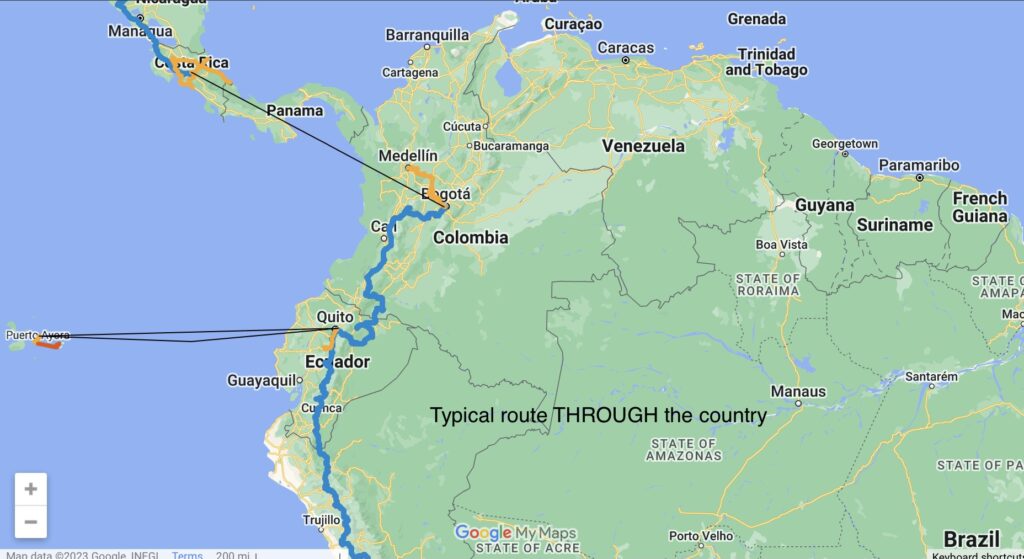
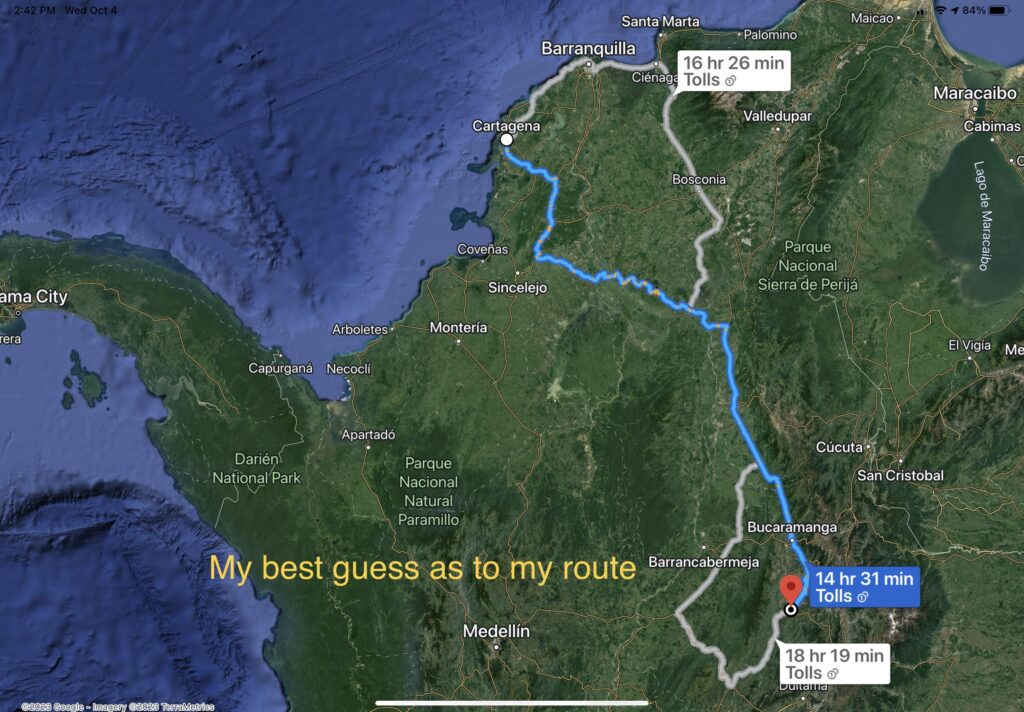
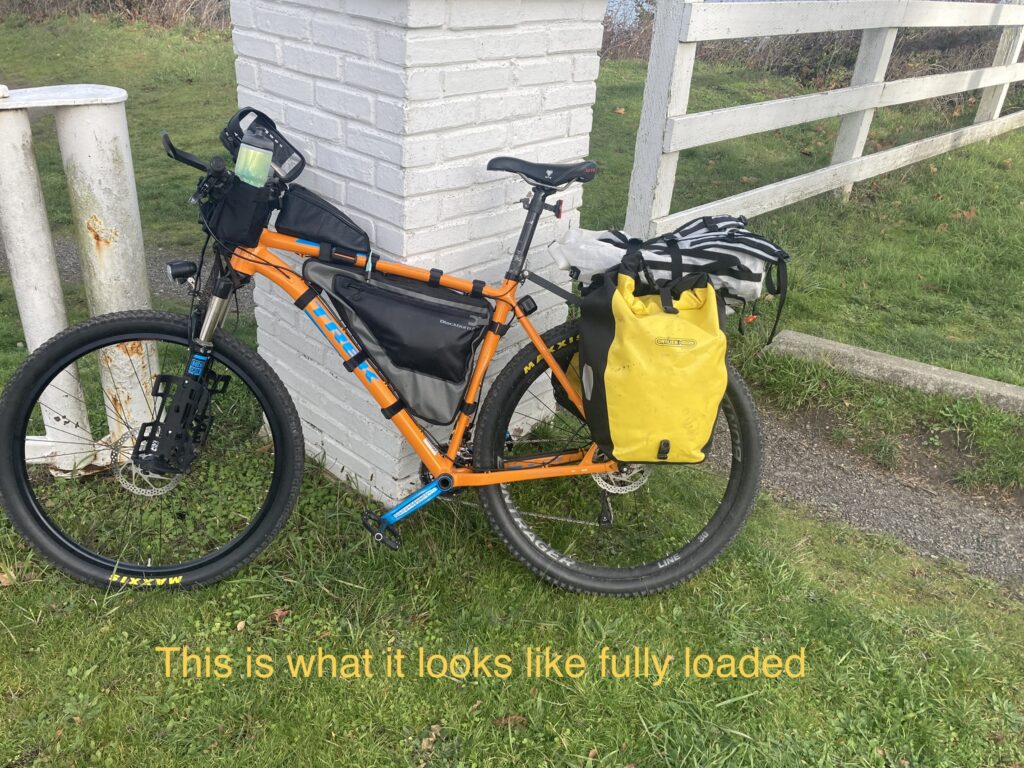
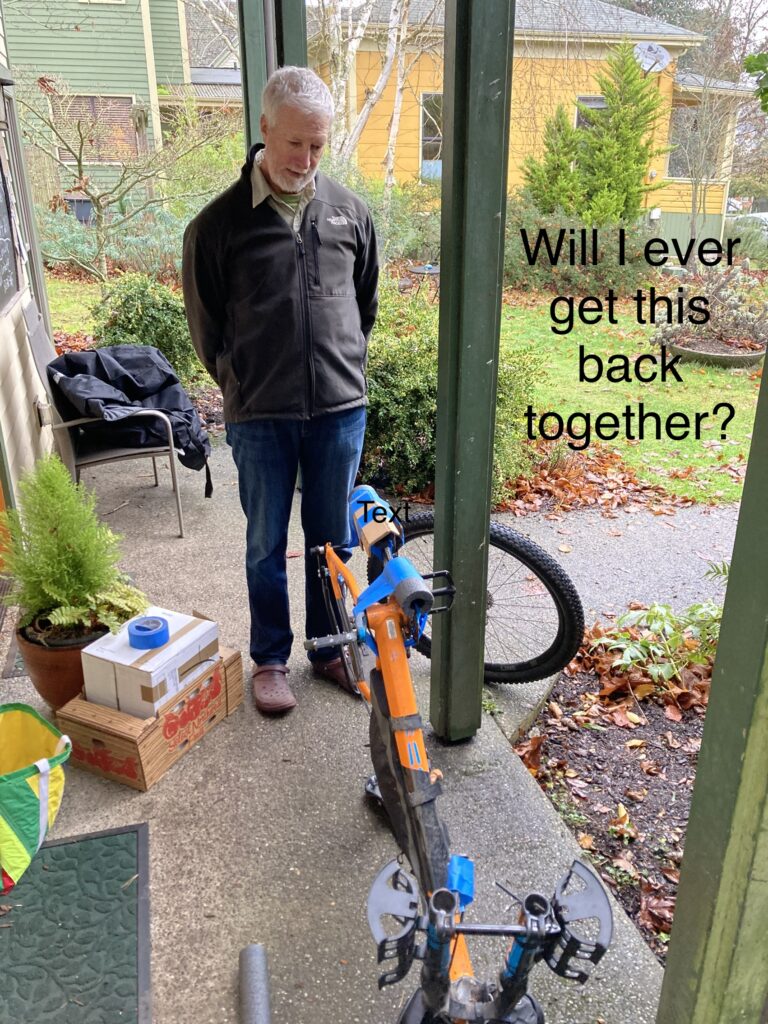
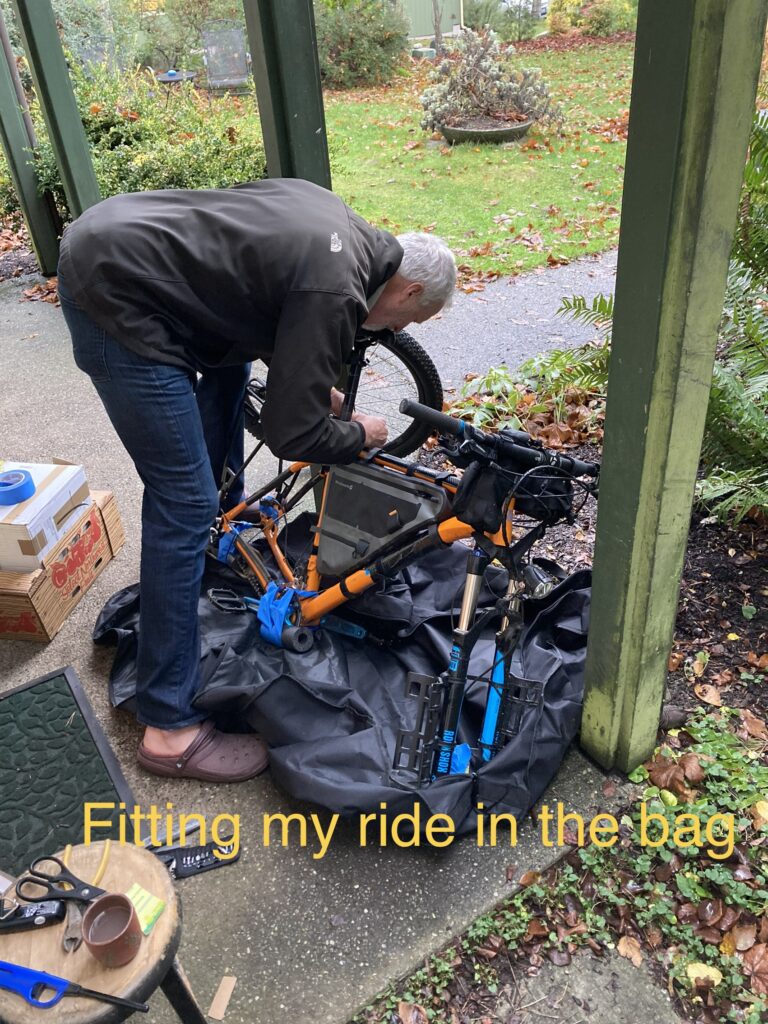
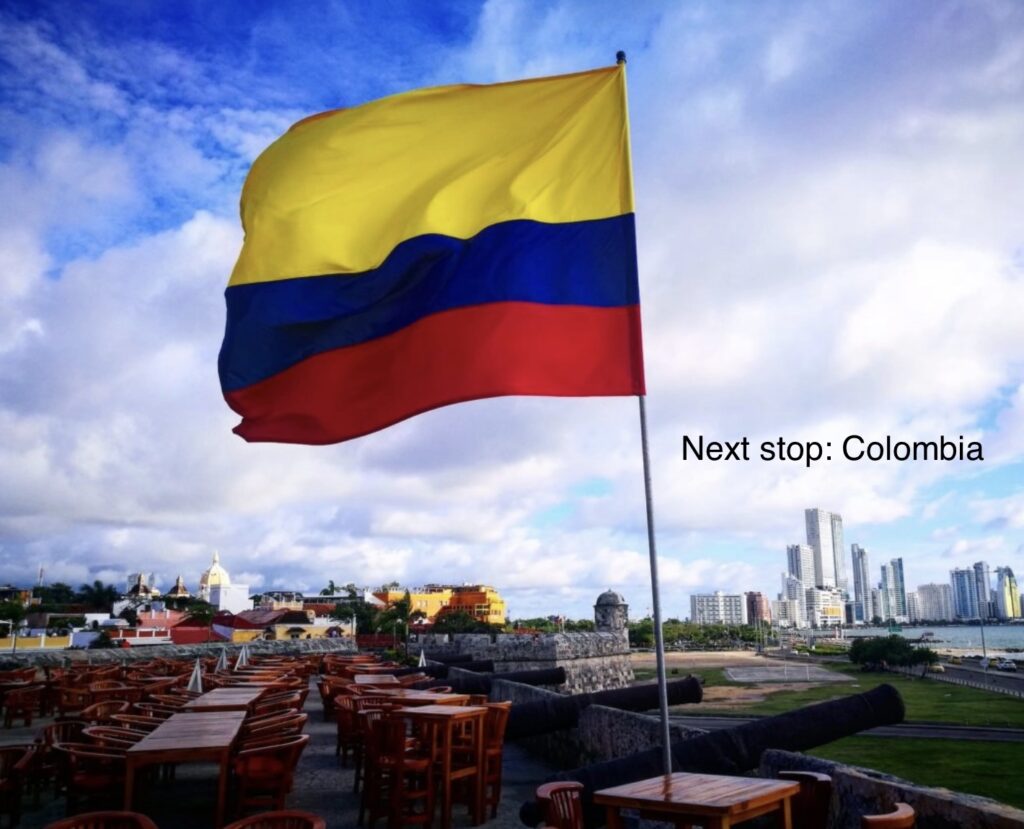
Like you said Charlie,”patience’–patience and deep breathing. You got this!
So far so good
They let me into the country for 90 days
Hey Charlie! Here’s some routes in Columbia: https://bikepacking.com/locations/colombia/
Am currently bikepacking the Baja Divide and headed to Bahia de Los Angeles tomorrow.
Jon
Thanks
I’ve been following your trip
Pretty exciting!
Charley
Sounds like a great adventure! Good luck and enjoy every minute!
Following your blog from Port Townsend, Charlie. Have fun and stay safe.
I’ll do my best.
Charley